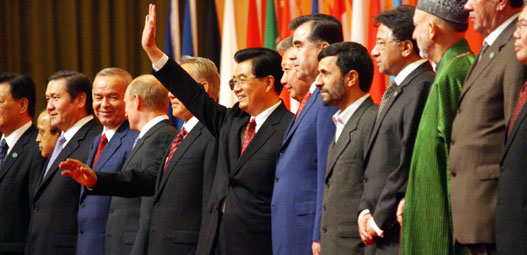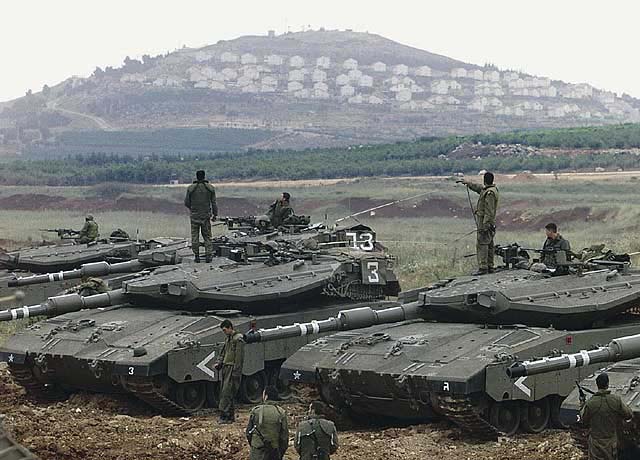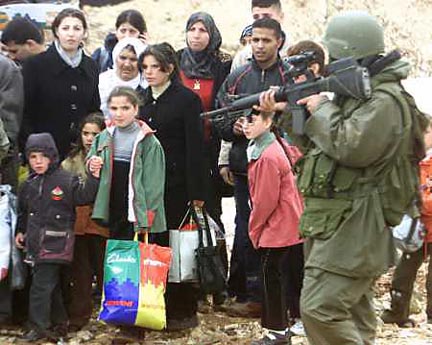Re: The Rise of the Russian Empire: Russo-Armenian Relations
The West Lost Russia

In contrast to the purported global warming, Russian-Western relations are undergoing a real cooling. The mounting frigidity in the relationship was symbolized in Moscow's surprise rush to the Arctic. The aim of this expedition was to gather scientific evidence to support a legal territorial claim to the Lomonosov Ridge. But this was just one salvo in a summer flurry that underscored a new, resurgent Russia. Others include:
• A diplomatic offensive across the Middle East and Asia that included hints of forming a natural gas cartel.
• President Vladimir Putin's moves to withdraw from the Treaty on Conventional Armed Forces in Europe.
• The resumption of long-range strategic bomber flights that will patrol areas bordering European and U.S. airspace.
• An announcement to expand the Navy's global presence, including basing once again some of its forces in the Mediterranean Sea.
• The militarization of the Shanghai Cooperation Organization, which includes Russia, China, Kazakhstan, Kyrgyzstan, Tajikistan and Uzbekistan as members and Iran, India, Pakistan and Mongolia as observers.
In short, Russia is back as a global player, and it is no longer a starry-eyed admirer of the United States. These are the bitter fruits of the West's -- and in particular the United States' -- mistaken policies toward Russia since the end of the Cold War. Instead of treating Moscow magnanimously, as historian Richard Pipes once urged, the West declared victory.
Unlike the victory in World War II over Nazi Germany, however, no Marshall Plan was forthcoming. Instead, the West promised but did not deliver timely economic assistance in the early 1990s. It also backed a disastrous and broadly unpopular privatization and economic reform program. Worst of all, it alienated the entire Russian elite by expanding NATO to include Poland, the Czech Republic, Hungary and the Baltic states. Further rounds of expansion may very well bring Georgia and Ukraine into the alliance. The NATO and European Union expansion, which did not include a substantive role for Russia, effectively locked Moscow out of a Western orbit that the Kremlin thought it was joining.
Early on, U.S. President Bill Clinton wondered aloud to his top Russia hand, Undersecretary of State Strobe Talbott, about how long they could continue to shove things down Moscow's throat. U.S. President George W. Bush followed Clinton's lead by declaring initially that Russia was no longer a major player in global affairs or a major focus of U.S. foreign policy. Shortly thereafter, Bush announced the U.S. withdrawal from the Anti-Ballistic Missile Treaty and the expansion of NATO closer to Russia's borders. Now Moscow's bitter disappointment with the West has taken the form of harsh anti-Americanism. It has also translated into a burning desire among the Russian elite and public to finally show the West that it would regret its policies once Russia "got up from its knees." That time has surely come.
Some analysts warned that this would be the inevitable result of NATO expansion and other flawed U.S. and Western policies. Only a partnership with Russia and a firm policy of drawing it into the West would prevent Moscow's turn to the East. This also would have prevented the revival of traditional Russian suspicion -- if not outright antagonism -- toward the West. Finally, a closer cooperation with Russia may have prevented Moscow's disenchantment with democracy, which it has interpreted as being no more than an insidious and cynical Western ploy to weaken Russia. The cost of NATO expansion is that Russia has been lost in the medium term -- and perhaps in the long term as well -- as a powerful, committed democracy and Western ally. Moreover, the West has pushed Russia closer to China and Iran.
If these are the costs of NATO expansion, what are the advantages? Few, if any. The alliance received from its new member states: a few thousand additional troops that are stationed in Afghanistan and Iraq, a three-jet Latvian air force and five Estonian nurses. Compare these benefits to Russia's vast military and intelligence resources and experience -- particularly in Afghanistan. Moreover, Moscow has helped to track down global jihadists, prevent the proliferation of weapons and materials of mass destruction and reconstruct Afghanistan. As a true ally, Russia could contribute much more to the Western alliance than the small new NATO members. All opinion polls now show that a plurality or majority of Russians regard the United States as the greatest threat to Russia and the world. Putin has repeatedly decried the U.S. impetus for a "unipolar" international structure -- which is to say, global hegemony.
The Russian elite's consensus is even harsher. Alexander Solzhenitsyn recently said the United States seeks to encircle and weaken Russia. This statement is highly symbolic, coming from the esteemed writer who once took refuge in the United States as a political refugee from the Soviet state. It also underscores how cold U.S.-Russian relations have become. One hopes the next U.S. administration will not repeat Clinton and Bush's mistakes of insulting and underestimating Moscow. Even in the best of circumstances, the next U.S. president and his or her Western allies will face the daunting task of piercing through the unfortunate and unforgiving perceptual lens through which resurgent Moscow views the West, especially Washington.
Source: http://www.themoscowtimes.com/storie...08/29/006.html
The West Lost Russia

In contrast to the purported global warming, Russian-Western relations are undergoing a real cooling. The mounting frigidity in the relationship was symbolized in Moscow's surprise rush to the Arctic. The aim of this expedition was to gather scientific evidence to support a legal territorial claim to the Lomonosov Ridge. But this was just one salvo in a summer flurry that underscored a new, resurgent Russia. Others include:
• A diplomatic offensive across the Middle East and Asia that included hints of forming a natural gas cartel.
• President Vladimir Putin's moves to withdraw from the Treaty on Conventional Armed Forces in Europe.
• The resumption of long-range strategic bomber flights that will patrol areas bordering European and U.S. airspace.
• An announcement to expand the Navy's global presence, including basing once again some of its forces in the Mediterranean Sea.
• The militarization of the Shanghai Cooperation Organization, which includes Russia, China, Kazakhstan, Kyrgyzstan, Tajikistan and Uzbekistan as members and Iran, India, Pakistan and Mongolia as observers.
In short, Russia is back as a global player, and it is no longer a starry-eyed admirer of the United States. These are the bitter fruits of the West's -- and in particular the United States' -- mistaken policies toward Russia since the end of the Cold War. Instead of treating Moscow magnanimously, as historian Richard Pipes once urged, the West declared victory.
Unlike the victory in World War II over Nazi Germany, however, no Marshall Plan was forthcoming. Instead, the West promised but did not deliver timely economic assistance in the early 1990s. It also backed a disastrous and broadly unpopular privatization and economic reform program. Worst of all, it alienated the entire Russian elite by expanding NATO to include Poland, the Czech Republic, Hungary and the Baltic states. Further rounds of expansion may very well bring Georgia and Ukraine into the alliance. The NATO and European Union expansion, which did not include a substantive role for Russia, effectively locked Moscow out of a Western orbit that the Kremlin thought it was joining.
Early on, U.S. President Bill Clinton wondered aloud to his top Russia hand, Undersecretary of State Strobe Talbott, about how long they could continue to shove things down Moscow's throat. U.S. President George W. Bush followed Clinton's lead by declaring initially that Russia was no longer a major player in global affairs or a major focus of U.S. foreign policy. Shortly thereafter, Bush announced the U.S. withdrawal from the Anti-Ballistic Missile Treaty and the expansion of NATO closer to Russia's borders. Now Moscow's bitter disappointment with the West has taken the form of harsh anti-Americanism. It has also translated into a burning desire among the Russian elite and public to finally show the West that it would regret its policies once Russia "got up from its knees." That time has surely come.
Some analysts warned that this would be the inevitable result of NATO expansion and other flawed U.S. and Western policies. Only a partnership with Russia and a firm policy of drawing it into the West would prevent Moscow's turn to the East. This also would have prevented the revival of traditional Russian suspicion -- if not outright antagonism -- toward the West. Finally, a closer cooperation with Russia may have prevented Moscow's disenchantment with democracy, which it has interpreted as being no more than an insidious and cynical Western ploy to weaken Russia. The cost of NATO expansion is that Russia has been lost in the medium term -- and perhaps in the long term as well -- as a powerful, committed democracy and Western ally. Moreover, the West has pushed Russia closer to China and Iran.
If these are the costs of NATO expansion, what are the advantages? Few, if any. The alliance received from its new member states: a few thousand additional troops that are stationed in Afghanistan and Iraq, a three-jet Latvian air force and five Estonian nurses. Compare these benefits to Russia's vast military and intelligence resources and experience -- particularly in Afghanistan. Moreover, Moscow has helped to track down global jihadists, prevent the proliferation of weapons and materials of mass destruction and reconstruct Afghanistan. As a true ally, Russia could contribute much more to the Western alliance than the small new NATO members. All opinion polls now show that a plurality or majority of Russians regard the United States as the greatest threat to Russia and the world. Putin has repeatedly decried the U.S. impetus for a "unipolar" international structure -- which is to say, global hegemony.
The Russian elite's consensus is even harsher. Alexander Solzhenitsyn recently said the United States seeks to encircle and weaken Russia. This statement is highly symbolic, coming from the esteemed writer who once took refuge in the United States as a political refugee from the Soviet state. It also underscores how cold U.S.-Russian relations have become. One hopes the next U.S. administration will not repeat Clinton and Bush's mistakes of insulting and underestimating Moscow. Even in the best of circumstances, the next U.S. president and his or her Western allies will face the daunting task of piercing through the unfortunate and unforgiving perceptual lens through which resurgent Moscow views the West, especially Washington.
Source: http://www.themoscowtimes.com/storie...08/29/006.html


















Comment